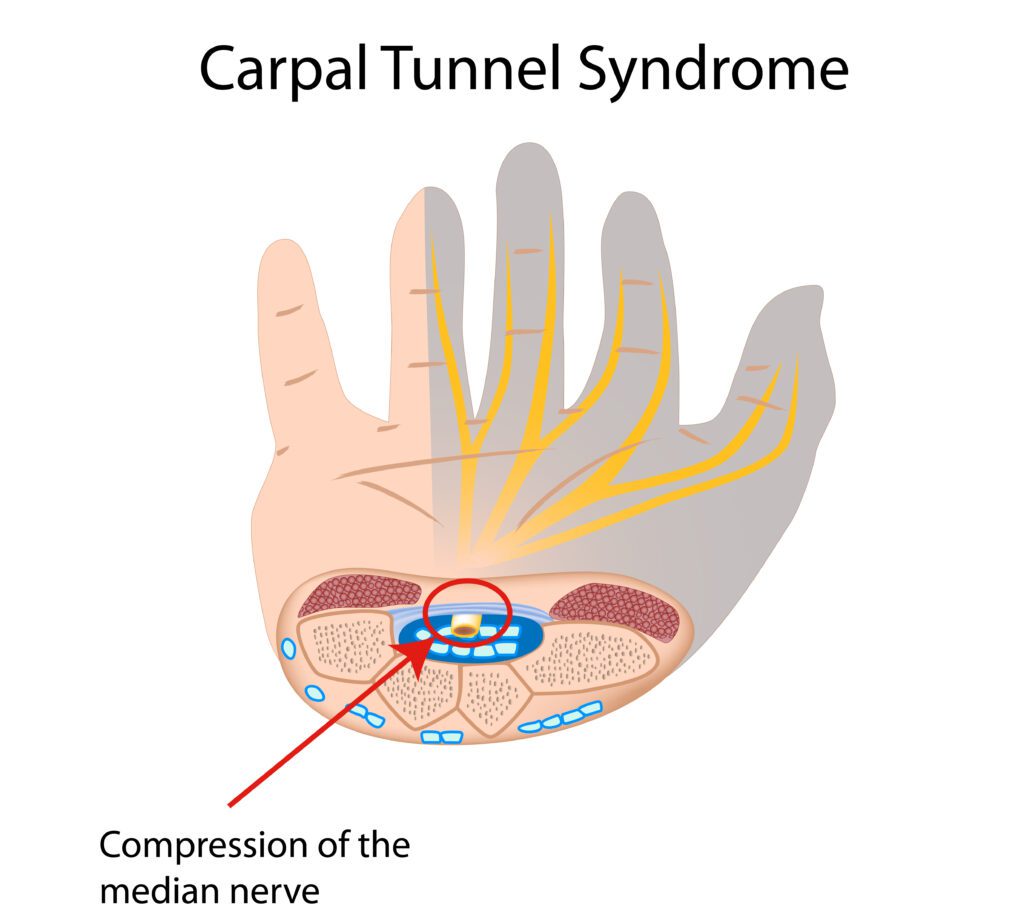Looking for Expert-Level VA Claim Answers?📱Call Us Now! 737-295-2226
In this guide, we’ll explore how to get a VA Rating for Carpal Tunnel Syndrome (CTS) as well as how to potentially qualify for Special Monthly Compensation for loss of use of a hand.
Your final VA Disability Rating for Carpal Tunnel depends upon the Frequency, Severity, and Duration of symptoms, including Painful Motion, Limitation of Range of Motion (ROM), and Functional Loss or Impairment.
VA Disability for Carpal Tunnel has ratings that range from 10% to 70%, with breaks at 20%, 30%, 40%, 50%, and 60%, with lower or higher ratings for non-dominant (Minor) versus dominant (Major) hand.
However, the most common Carpal Tunnel Syndrome VA Rating is 10%, which is “mild incomplete paralysis of the median nerve.”
Alright, let’s jump into this Ultimate Guide for getting service-connected disability for Carpal Tunnel Syndrome.
Table of Contents
Summary of Key Points
- Carpal Tunnel Syndrome (CTS) is caused by compression of the median nerve and can lead to pain, numbness, tingling, and loss of hand function.
- The VA rates CTS under Diagnostic Code 8515 (Median Nerve Paralysis) with ratings from 10% to 70%, depending on whether the condition affects the dominant or non-dominant hand and how severe the symptoms are.
- The most common rating is 10% for mild incomplete paralysis, but moderate, severe, or complete paralysis can qualify for much higher ratings.
- Veterans may also qualify for Special Monthly Compensation (SMC-K) if they lose effective use of a hand due to severe CTS.

What is Carpal Tunnel Syndrome?
Carpal Tunnel Syndrome, or CTS, is a painful condition that results from pressure on the median nerve in the hand. The “Carpal Tunnel” is a narrow passageway surrounded by bones and ligaments on the palm side of your hand.
The median nerve runs through the carpal tunnel and provides feeling and movement to parts of the hand, including the thumb and first three fingers.
When the median nerve becomes compressed, veterans may experience painful symptoms such as numbness, tingling, and weakness in the hand and arm.
In some cases, veterans with carpal tunnel may also have trouble gripping objects or performing other tasks that require manual dexterity.
Common signs and symptoms
- Burning, itching, numbness, or pain in your palm and thumb or your index and middle fingers
- Weakness in your hand and trouble holding things
- Shock-like feelings that move into your fingers
- Tingling that moves up into your arm
VA Disability Rating for Carpal Tunnel: Basic Eligibility Criteria
To be eligible for a Carpal Tunnel VA Rating, a veteran must meet three (3) criteria by law:
- #1. Medical diagnosis of Carpal Tunnel Syndrome in a medical record (Service Treatment Records, VA medical records, or private medical records)
- #2. Your Carpal Tunnel Syndrome was caused or made worse by your active-duty military service OR by another service-connected disability for secondary service connection (“Nexus” for service connection)
- #3. Persistent and recurring symptoms of Carpal Tunnel Syndrome (“Severity of Symptoms”) to include how it affects your work, life, and social functioning
If you think you have a painful hand condition such as Carpal Tunnel Syndrome, but don’t have a medical diagnosis, pick-up the phone and call the VA mental health facility nearest you to make an appointment right away!
Increasing Your VA Rating for Carpal Tunnel
If you’re trying to increase your VA rating for Carpal Tunnel, you need to prove to the VA that your symptoms are now worse and warrant the higher rating criteria by law.
The #1 best way to increase your VA rating for Carpal Tunnel is to have objective medical evidence to show the degradation of your hand movement over time.
(1) Limitation of Range of Motion and (2) Pain are the two most common factors that determine your final VA rating for hand conditions such as Carpal Tunnel Syndrome.
How the VA Rates Carpal Tunnel
The VA typically rates Carpal Tunnel under CFR Title 38, Part 4, Schedule for Rating Disabilities, Diagnostic Code 8515, The Median Nerve, Complete or Incomplete Paralysis.
- Complete paralysis: If the hand is stuck bent away from the body at the wrist, the middle and index fingers are stuck in extension more than normal (cannot move either down or side to side), thumb is straight and stuck right up next to the index finger (the hand is completely flat) and the muscles at the base of thumb are atrophied (wasting away), and the palm of the hand cannot be turned to face downward, it is rated 70% for the Dominant arm and 60% for the Non-dominant arm.
- Severe Incomplete paralysis: Rated at 50% for the dominant arm and 40% for the non-dominant.
- Moderate Incomplete paralysis: Rated at 30% for the dominant and 20% for the non-dominant.
- Mild Incomplete paralysis: Rated at 10% for either arm.
Carpal Tunnel Syndrome VA Rating Scale
| DC 8515, The Median Nerve, Paralysis Of: | *Major | *Minor |
| Complete: The hand inclined to the ulnar side, the index and middle fingers more extended than normally, considerable atrophy of the muscles of the thenar eminence, the thumb in the plane of the hand (ape hand); pronation incomplete and defective, absence of flexion of index finger and feeble flexion of middle finger, cannot make a fist, index and middle fingers remain extended; cannot flex distal phalanx of thumb, defective opposition and abduction of the thumb, at right angles to palm; flexion of wrist weakened; pain with trophic disturbances | 70% | 60% |
| Incomplete: | ||
| Severe | 50% | 40% |
| Moderate | 30% | 20% |
| Mild | 10% | 10% |
*Major and *Minor refer to the Dominant and Non-Dominant Hand. For example, if you’re right-handed and have carpal tunnel syndrome in your right hand (dominant), you’d receive the Major rating. If you’re right-handed and have carpal tunnel syndrome in your left-hand, you’d receive the Minor rating.
VA Disability Rating for Carpal Tunnel After Surgery
Generally, you’ll receive a 10% VA disability rating for carpal tunnel after surgery; however, you may be eligible for up to 70%, depending on the severity of your condition.
In addition, your VA rating will depend on whether the condition affects your dominant or nondominant hand. If your carpal tunnel is severe enough to require surgery, you’re more likely to qualify for a VA disability rating.
What are Some Secondary Conditions to Carpal Tunnel?

The following conditions have been medically linked to cause or make Carpal Tunnel worse:
- Diabetes
- Thyroid Condition
- High Blood Pressure
- Arthritis
- Fractures or trauma to the wrist
- Fluid retention from pregnancy or menopause
Carpal Tunnel Syndrome can also be caused or made worse if your wrist is frequently overextended.
This repetitive motion of your wrist can lead to swelling and compression of the median nerve.
The following workplace factors can contribute to Carpal Tunnel Syndrome:
- Straining your wrists while using a keyboard or mouse
- Vibrations from using hand tools or power tools, especially in cold environments
- Any repeated movement that overextends your wrist
Can I get Special Monthly Compensation for Carpal Tunnel Syndrome?
Yes, if your Carpal Tunnel Syndrome is severe, meaning you have no effective remaining function of one or both hands, you can qualify for Special Monthly Compensation (SMC-K) for Loss of Use of a Hand.
If you qualify for SMC-K, the VA automatically adds $118.33 per month to your basic disability compensation pay rate.
Veterans can receive up to three SMC-K awards in addition to basic disability pay and other SMC rates.
Are You Stuck, Frustrated, and Underrated? WE GOT YOUR SIX!

- VA Claims Insider is the #1 most trusted name in VA disability claims.
- Work directly with a VA claims coach who can educate you to VA claim victory.
- 25,000+ disabled veterans have served in our membership programs since 2016.
- 30% average rating increase for veterans who complete our #1-rated Elite program.
- 4.7/5.0 average rating out of 5,500+ total reviews; over 4,500 5-star reviews.
Click the Red Button to Join the #1 Rated VA Claims Insider Elite Program and Start Today.
FAQs | Frequently Asked Questions
Is Carpal Tunnel a VA disability?
Yes, Carpal Tunnel is a VA disability and can be rated at 10%, 20%, 30%, 40%, 50%, 60%, or 70% depending upon the non-dominant (Minor) versus dominant (Major) hand as well as the Frequency, Severity, and Duration of your symptoms. Your final rating for Carpal Tunnel also depends on Painful Motion, Limitation of Range of Motion (ROM), and Functional Loss or Impairment.
How does the VA rate carpal tunnel syndrome?
The VA uses Diagnostic Code 8515 (Median Nerve Paralysis). Ratings range from 10% (mild incomplete paralysis)to 70% (complete paralysis of the dominant hand). The rating depends on severity, functional loss, and whether it affects your dominant or non-dominant hand.
What VA disability rating can I get for carpal tunnel after surgery?
Many veterans receive a 10% rating after carpal tunnel surgery, especially if symptoms improve. However, if you still have ongoing pain, weakness, numbness, or limited function after surgery, you may qualify for ratings of 30%, 40%, 50%, 60%, or even 70% depending on severity and which hand is affected.
Can carpal tunnel qualify for Special Monthly Compensation (SMC)?
Yes. If your CTS is so severe that you lose effective use of one or both hands, you may qualify for SMC-K for loss of use of a hand, which adds extra monthly compensation to your standard VA disability pay.
What secondary conditions can make carpal tunnel worse?
Diabetes, thyroid conditions, arthritis, high blood pressure, and certain wrist injuries can contribute to or aggravate CTS. Repetitive wrist motions (such as typing, tool use, or vibration exposure) may also worsen symptoms.
About the Author

Brian Reese
Brian Reese is a world-renowned VA disability benefits expert and the #1 bestselling author of VA Claim Secrets and You Deserve It. Motivated by his own frustration with the VA claim process, Brian founded VA Claims Insider to help disabled veterans secure their VA disability compensation faster, regardless of their past struggles with the VA. Since 2013, he has positively impacted the lives of over 10 million military, veterans, and their families.
A former active-duty Air Force officer, Brian has extensive experience leading diverse teams in challenging international environments, including a combat tour in Afghanistan in 2011 supporting Operation ENDURING FREEDOM.
Brian is a Distinguished Graduate of Management from the United States Air Force Academy and earned his MBA from Oklahoma State University’s Spears School of Business, where he was a National Honor Scholar, ranking in the top 1% of his class.


